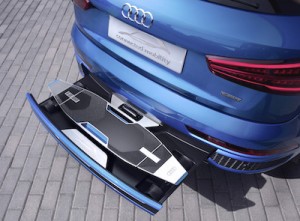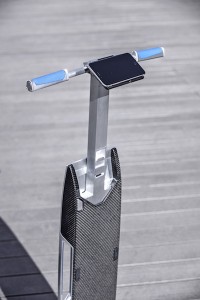German automaker Audi is providing urban customers with a new way to get around town.
At Auto China 2016 in Beijing, the Volkswagen-owned brand unveiled its connected mobility concept, aimed to help navigate urban areas. The innovative and green way around town capitalizes on both consumer and industrial trends and will help the brand ensure a devout audience.
“Technology for the automobile is ever-increasing towards personalization and ability to multitask while commuting through larger cities,” said Brett Levine, cofounder of Drive Anything, Huntingdon Valley, PA. “This is a natural growth in that trend.
“Audi wants to be seen, as do other luxury brands, at the forefront of this technology and a leader in it,” he said. “Impacting consumer image The brand is critical as the Chinese market flourishes.”
Mr. Levine is not associated with Audi, but agreed to comment as an industry expert.
Audi did not respond by press deadline.
All a-board
Audi’s mobility concept car is based on the Q3, its urban compact SUV produced locally in China. In keeping with the event’s audience, the concept was geared toward Chinese consumers in urban areas and densely trafficked megacities, most notably Beijing.
The concept targets young drivers with mobility demands and a concern for the pollution of petrol burning cars. Attached to the vehicle and integrated into the rear bumper is a longboard of about 3.5 feet, which charges when attached to the car.
The automobile’s infotainment system will link to the driver’s smartphone calendar and then, based on real-time traffic information, calculate the proper mobility mix. It will instruct the user to drive for as long as it is faster, and then help find a parking spot where the user can switch to the electric longboard to save time and protect the environment.
When on the board, the directions will synch with the Audi MMI connect application on the phone to continue guiding the user. It has a max speed of 18 mph and a battery range of more than seven miles.
It has three driving modes. In “scooter mode,” the phone can be clipped to the handle to display directions, and speed can be adjusted via a remote control on the other handlebar. Additionally, a backpack can be attached to the steering rack.
Audi longboard in scooter mode, with phone attached
Sport mode has the handlebar folded down, putting the remote control and speed directly into the user’s hand. In the final mode, the board is a transport device, allowing the user to put suitcases, groceries and shopping bags on board. It will automatically follow its owner via smartphone or smartwatch connectivity.
Although the concept has not yet been put into production, it signifies Audi’s commitment to offering convenient solutions for mobility. Populations have been migrating to urban areas throughout the century and are projected to continue doing so, meaning population densities will increase.
Audi connected mobility concept longboard
With increased population density, owning an automobile becomes more difficult. Ride-sharing services have began to penetrate the market, but Audi’s mobility concept offers the convenience of owning a car with faster and greener transportation options.
Additionally, the concept reveals Audi’s attention to more sustainable transportation and shows that the brand is focused on China, still the fastest growing luxury market, and young consumers.
Favored locale
Other automakers have also used events to promote locale-specific concepts.
For example, at the Tokyo Motor Show last year, German automaker Mercedes-Benz looked beyond the millennial market with its “mobile club lounge.”
The “Vision Tokyo” concept model is an electric-powered, autonomous driving vehicle aimed at the urban trendsetters of Generation Z. A variety of technological advances are presenting automakers with enormous opportunities to redefine the luxury automotive market (see story).
As young consumers hold off on buying cars in favor of alternate mobility solutions, automakers are finding creative new twists on the service to stand out.
German automaker BMW is extending its commitment to mobility with the new ReachNow brand.
ReachNow, launched in Seattle on April 12, is the American counterpart to the growing European “DriveNow” brand, offering on-demand mobility to metropolitan dwellers. Supplementing its traditional model with a move into the mobility sector will help BMW remain a major player in the automotive industry among a larger group of consumers (see story).
“The Chinese market, in particular the younger demographic, is growing and [Audi] wants to make a footprint with those potential clients,” Mr. Levine said. “Making an impact on those groups now will influence their purchasing decisions later.
“I think going forward as technology and vehicle automation merge in the next few years it will be extremely beneficial, particularly in more populated and urban dense areas.”
from
http://redirect.viglink.com?u=http%3A%2F%2Fredirect.viglink.com%2F%3Fu%3Dhttp%253A%252F%252Fwww.luxurydaily.com%252Faudi-eases-urban-mobility-with-smart-navigation-longboard-attachment%252F%26amp%3Bkey%3Dddaed8f51db7bb1330a6f6de768a69b8&key=ddaed8f51db7bb1330a6f6de768a69b8


No comments:
Post a Comment